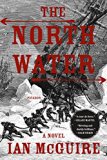Summary | Excerpt | Reviews | Beyond the Book | Readalikes | Genres & Themes | Author Bio

A Novel
by Ian McGuire
The bone gives way easily. There is a fine spray of blood and a noise like a wet stick snapping. The Shetlander flops senselessly forwards, and his teeth and nose break against the cobblestones. Before Hester can scream, the man has the blubber-knife against her throat.
"I'll slice you open like a fucking codfish," he promises.
She looks at him wildly, then holds up her mucky hands in surrender.
He empties the Shetlander's pockets, takes his money and tobacco, and throws the rest aside. There is a halo of blood dilating around the Shetlander's face and head, but he is still faintly breathing.
"We need to move that bastard now," Hester says, "or I'll be in the shit."
"So move him," the man says. He feels lighter than he did a moment before, as if the world has widened round him.
Hester tries to drag the Shetlander around by the arm, but he's too heavy. She skids on the blood and falls over onto the cobbles. She laughs to herself, then begins to moan. The man opens the coal shed door and drags the Shetlander inside by the heels.
"They can find him tomorrow," he says. "I'll be long gone by then."
She stands up, still unsteady from the drink, and tries impossibly to wipe the mud from her skirts. The man turns to leave.
"Give us a shilling or two, will you, darling?" Hester calls out to him. "For all me trouble."
* * *
It takes him an hour to hunt down the boy. His name is Albert Stubbs and he sleeps in a brick culvert below the north bridge and lives off bones and peelings and the occasional copper earned by running errands for the drunkards who gather in the shithole taverns by the waterfront waiting for a ship.
The man offers him food. He shows him the money he stole from the Shetlander.
"Tell me what you want," he says, "and I'll buy it for you."
The boy looks back at him speechlessly, like an animal surprised in its lair. The man notices he has no smell to him at all—amidst all this filth he has remained somehow clean, unsullied, as if the natural darkness of his pigment is a protection against sin and not, as some men believe, an expression of it.
"You're a sight to see," the man tells him.
The boy asks for rum, and the man takes a greasy half bottle from his pocket and gives it to him. As the boy drinks the rum, his eyes glaze slightly and the fierceness of his reticence declines.
"My name's Henry Drax," the man explains, as softly as he is able to. "I'm a harpooner. I ship at dawn on theVolunteer."
The boy nods without interest, as if this is all information he had heard long before. His hair is musty and dull, but his skin is preternaturally clean. It shines in the tarnished moonlight like a piece of polished teak. The boy is shoeless, and the soles of his feet have become blackened and horny from contact with the pavement. Drax feels the urge to touch him now—on the side of the face perhaps or the peak of the shoulder. It would be a signal, he thinks, a way to begin.
"I saw you before in the tavern," the boy says. "You had no money then."
"My situation is altered," Drax explains.
The boy nods again and drinks more rum. Perhaps he is nearer twelve, Drax thinks, but stunted as they often are. He reaches out and takes the bottle from the boy's lips.
"You should eat something," he says. "Come with me."
They walk together without speaking, up Wincomlee and Sculcoates, past the Whalebone Inn, past the timber yards. They stop in at Fletcher's bakery and Drax waits while the boy wolfs down a meat pie.
When the boy has finished, he wipes his mouth, scours the phlegm from the back of his throat, and spits it out into the gutter. He looks suddenly older than before.
"I know a place we can go to," he says, pointing across the road. "Just down there, see, on past the boatyard."
Drax realizes immediately that this must be a trap. If he goes into the boatyard with the nigger boy he will be beaten bloody and stripped down like a cunt. It is a surprise that the boy has misprized him so thoroughly. He feels, first, contempt for the boy's ill judgment, and then, more pleasantly, like the swell and shudder of a fresh idea, the beginnings of fury.
Excerpted from The North Water by Ian McGuire. Copyright © 2016 by Ian McGuire. Excerpted by permission of Henry Holt and Company. All rights reserved. No part of this excerpt may be reproduced or reprinted without permission in writing from the publisher.
Your guide toexceptional books
BookBrowse seeks out and recommends the best in contemporary fiction and nonfiction—books that not only engage and entertain but also deepen our understanding of ourselves and the world around us.